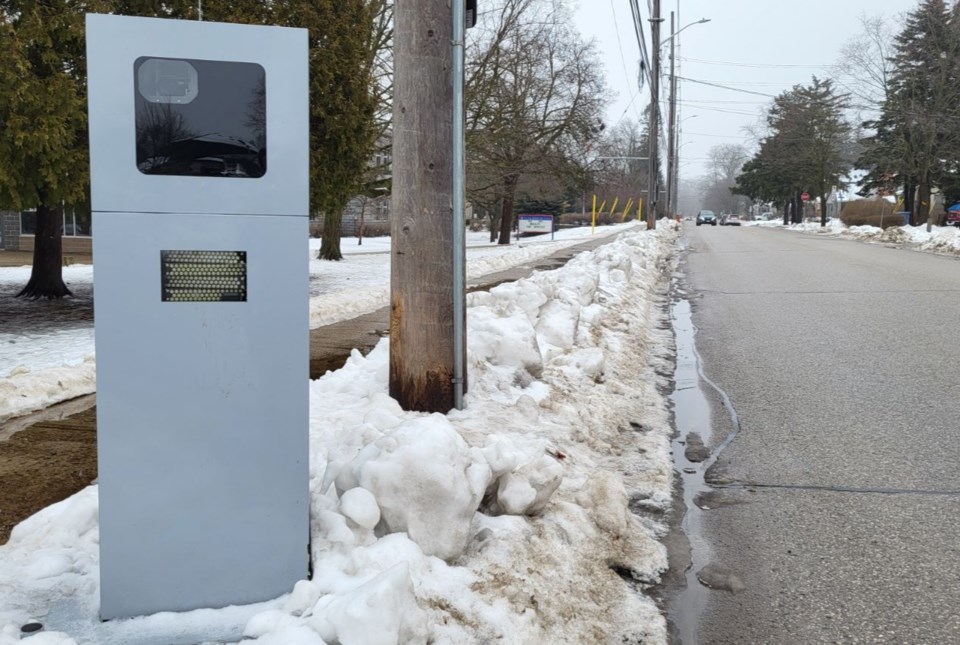Guelph drivers are racking up thousands of dollars in speeding tickets with the city's new automated speed enforcement program, which saw a total revenue of $447,120 in the first five months.
But after all expenses are paid, only a fraction of that money goes back to the city.
Four automated speed cameras were installed as part of the city’s Vision Zero program, aimed at making the community safer. Installed over the summer, they’re rotated every three months between 16 locations in 30 km/h school zones.
The speed camera enforcement program was approved in 2022 with the anticipated expense of $1.375 million with equal revenue generated for 2023, and $1.378 million in 2024. The budget is revenue-neutral, meaning all costs are funded by the fines.
So far, from Aug. 1 to Dec. 31, the total revenue generated from speeding tickets is $447,120, with 3,820 infractions, according to Steve Anderson, engineering and transportation services manager for the City of Guelph.
Of that, only about $70,000, or 15.6 per cent, went back to the city, to be placed in a reserve fund dedicated to road safety.
“These are tools used to help some driver behaviour, increase the safety of our streets. It’s all about getting drivers to obey posted speed limits, reduce the likelihood of severe and fatal injury outcomes,” he said. “That’s the driving force behind this. It is not designed to make the city a bunch of money," Anderson said.
That number is what’s left after the city pays the expenses for the program to the vendor, the processing centre operated by the City of Toronto, the provincial offences court system in Guelph, and city staff who run the program.
The automated speed camera vendor Redflex owns, operates and maintains the speed cameras, and provides traffic enforcement services and solutions for government, police and traffic departments globally. It’s a subsidiary of Verra Mobility, an Arizona-based safe transportation tech company.
The company reported a total revenue of $90.3 million for its government solutions segment in the third quarter of 2023, which includes government-contracted programs like the Automated Speed Enforcement (ASE) program in Ontario.
Anderson said he couldn’t share what amount or percentage Redflex receives from the revenue generated by the speeding tickets in Guelph, “because then another company could probably figure out their pricing and maybe undercut them on a future bid.”
He did note that the city doesn’t pay any “capital costs,” instead paying a daily rate to the company.
“And they do everything with the cameras; they own the equipment, they do all that stuff. We simply pay a daily rate,” he said.
When a Redflex camera takes a picture of a vehicle exceeding the speed limit, the image is stored and sent to the joint processing centre operated by the City of Toronto on behalf of all partnering municipalities.
The cost to operate it is shared among those municipalities, Anderson said.
The city pays a percentage of the total number of tickets it’s issued compared to the rest of the province to cover expenses.
“So it’s not necessarily a set amount, it’s determined based on the number of violations Guelph has,” he said.
Between Aug. 1 to Dec. 31, Guelph’s tickets amounted to under one per cent of violations in the province, so the processing centre received less than one per cent of the total revenue.
The remainder goes to the Provincial Offences Court in Guelph and a portion of compensation of Guelph city hall staff who administer the program.
He noted the provincial offences court and the processing centre don’t profit from the program; the money allocated to them merely covers the costs.
Every ticket issued will also have $5 court fee and a victim surcharge fee that supports victims of crime. These fees would, for instance, bring a $60 ticket up to $80.
“Automated speed enforcement is consistent with all enforcement programs in that portions of the fines collected go to cover administrative, court, provincial and labour costs,” Anderson said. “Automated enforcement also frees up Guelph Police resources for other enforcement requirements.”
He noted that not everyone has paid their fines, so the total revenue doesn’t perfectly match the number of infractions, either.
Earlier this month residents expressed concern regarding long processing times they say are resulting in a higher number of individual infractions. For instance, many tickets take three to four weeks to arrive in the mail.
Anderson recently met with “some peers who work for municipalities that are in the program,” some of whom had heard similar concerns in their own municipalities when the program launched, he said.
“We are going to continue to have some dialogue to see what influence we might have on getting that time reduced,” he said.
“We do not have a direct contract with Redflex. They have a contract with the City of Toronto, and that’s the contract that we’ve entered into. So we don’t have the same level of control as if we had that direct contract,” he said. “But we’re certainly advocating.”




